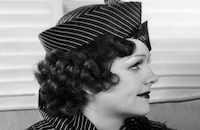The Music Man

Brief Synopsis
Cast & Crew
Morton Dacosta
Robert Preston
Shirley Jones
Buddy Hackett
Hermione Gingold
Paul Ford
Film Details
Technical Specs

Synopsis
"Professor" Harold Hill, a fast-talking traveling salesman, schemes to take money from the citizens of River City, Iowa, in the summer of 1912, by convincing them that a boys' band will put an end to the moral corruption resulting from the presence of a pool hall in the community. He sells instruments and uniforms to River City parents with the understanding that he will organize a band and teach the children to play; however, he intends to abscond with the money before the arrival of the instruments. Assisted by Marcellus Washburn, the town stableboy who helped Harold defraud customers in the East, Harold convinces the stubborn Iowa townspeople that he is an accomplished musician with a degree from a conservatory in Gary, Indiana.
Marian Paroo, the piano teacher and librarian, uncovers evidence of his trumped-up credentials; but before she can tell Mayor Shinn, the owner of the pool hall, Harold charms her into believing he has developed the "think system" of learning to play musical instruments by humming Mozart's Minuet in G. Harold's influence transforms the quarreling school board into a harmonizing barbershop quartet, petty gossips into a ladies' dance committee, shy and lisping Winthrop Paroo into a happy child with dreams of playing in a band, and the high-strung "old maid" Marian into a young woman in love. The instruments and uniforms arrive, but Marcellus cannot convince Harold to leave town. On the evening of the ice-cream social, Charlie Cowell, a traveling anvil salesman, arrives in River City to expose Harold's scheme. Marian tries to stop him at first, but he tells her that Harold has romanced piano teachers in many towns. The alerted citizens chase Harold, planning to tar and feather him, but his love for Marian prevents him from escaping the mob.
They handcuff the music man and bring him to Town Hall where the uniformed boys have assembled with their instruments. Harold pleads with the boys to employ the "think system"; and to his surprise, a ragged form of the Minuet in G escapes from the instruments. The shabby band becomes a splendid parade of color and music marching down the main street of River City, led by Harold with Marian at his side. Musical numbers: "Rock Island," "Iowa Stubborn," "Trouble," "Piano Lesson," "Goodnight My Someone," "Seventy-Six Trombones," "Sincere," "The Sadder-but-Wiser Girl," "Pickilittle," "Goodnight My Ladies," "Marian the Librarian," "Being in Love," "Wells Fargo Wagon," "It's You," "Shipoopi," "Lida Rose," "Will I Ever Tell You," "Gary, Indiana," "Till There Was You."

Director
Morton Dacosta
Cast

Robert Preston

Shirley Jones

Buddy Hackett

Hermione Gingold

Paul Ford
Al Shea
Wayne Ward
Vern Reed
Bill Spangenberg

Pert Kelton
Timmy Everett
Susan Luckey

Ronny Howard
Harry Hickox

Charles Lane

Mary Wickes
Monique Vermont
Ronnie Dapo
Jesslyn Fax
Patty Lee Hilka
Garry Potter
J. Delos Jewkes
Ray Kellogg
William Fawcett
Rance Howard
Roy Dean
David Swain
Arthur Mills
Rand Barker
Jeannine Burnier
Shirley Claire
Natalie Core
Therese Lyon
Penelope Martin

Barbara Pepper
Anne Loos
Peggy Wynne
Hank Worden
Milton Parsons
Natalie Masters
Peggy Mondo

Sarah Seegar
Adnia Rice
Casey Adams
Charles Perchesky
Crew
Gordon Bau
Robert Burks
Frank Comstock
Morton Dacosta
Joel Freeman
Paul Groesse
Marion Hargrove
Ray Heindorf
Ray Heindorf
Charles Henderson
George James Hopkins
Gus Levene
Russell Llewellyn
M. A. Merrick
Wolfgang Amadeus Mozart
Tom Panko
Jean Burt Reilly
Myrl Stoltz
Dolph Thomas
Onna White
Meredith Willson
William Ziegler

Photo Collections
Videos
Movie Clip





Trailer
Hosted Intro






Film Details
Technical Specs

Award Wins
Best Score
Award Nominations
Best Art Direction
Best Costume Design
Best Editing
Best Picture
Best Sound
Articles
The Music Man
Leading man Robert Preston went into the project an underdog, too. He had been the perennial second lead in Hollywood during the '40s, usually dying before the final reel. In the '50s, as the studios were cutting back production, he moved to the stage, where he had enjoyed a few modest hits. But he had never done a musical before. Nor was he first choice to play Harold Hill, the musical con artist. Wilson had written the role for his friend, bandleader Phil Harris, but Harris had decided not to risk the move to Broadway. Then it was offered to and rejected by Gene Kelly, Danny Kaye and Ray Bolger before they settled for the perfect man for the part, Preston.
With over 800 performances as Harold Hill and a Tony Award for Best Actor in a Musical, Preston would have seemed the logical man to star in the film version, but once again, he wasn't first choice. Both Frank Sinatra and Bing Crosby tried to buy the film rights, but Wilson turned them down. He finally said yes to Jack Warner, who wanted box office insurance in the form of Cary Grant. Grant's refusal became famous: "Not only will I not play it, but if Robert Preston doesn't do it, I won't even see the picture" - though the line turned up again two years later when he turned down the Rex Harrison role in My Fair Lady. Finally, after much pleading from Willson and the show's original director, Morton Da Costa, Warner cast Preston and got the studio's biggest hit of the year.
With Preston in place Warner decided to keep on several other cast members, including the barbershop quartet The Buffalo Bills; Pert Kelton, the one-time movie vamp who was now playing the heroine's mother; and Paul Ford, who had taken over the mayor's role from David Burns. Among new additions were Shirley Jones as leading lady (in place of Broadway legend Barbara Cook) and as her younger brother, the young Ron Howard, who would one day become one of Hollywood's top directors.
In another rare move for Hollywood, the film retained almost all of the show's songs. The only change was in Marian's romantic ballad, with Willson writing a new song, "Being in Love," to replace the original "My White Knight." The reason given at the time was that the new song was more in Jones's range. According to show-biz legend, however, "My White Knight" had actually been written by Loesser (it's very similar to a number cut from his opera The Most Happy Fella), who refused to sell the rights to Warner Bros.
Director/Producer: Morton Da Costa
Screenplay: Marion Hargrove
Based on the Musical by Meredith Willson and Franklyn Lacey
Cinematography: Robert Burks
Art Direction: Paul Groesse
Music: Meredith Willson
Music Director: Ray Heindorf
Principle Cast: Robert Preston (Harold Hill), Shirley Jones (Marian Paroo), Buddy Hackett (Marcellus Washburn), Hermione Gingold (Eulalie MacKechnie Shinn), Paul Ford (Mayor Shinn), Pert Kelton (Mrs. Paroo), Ron Howard (Winthrop Paroo)
C-152m. Letterboxed.
By Frank Miller

The Music Man
Quotes
A man can't turn tail and run just because a little personal risk is involved. What did Shakespeare say? "Cowards die a thousand deaths, the brave man... only 500"?- Harold Hill
It's as clear as a buttonhook in the well water!- Mayor Shinn
So what the heck? You're welcome! Join us at the picnic! You can eat your fill of all the food you bring yourself.- Citizens of River City
You watch your phraseology!- Mayor Shinn
When a woman's got a husband, and you've got none, why should she take advice from you? Even if you can quote Balzac and Shakespeare and all them other high-falutin' Greeks.- Mrs. Paroo
Trivia
River City was based on Meredith Wilson's home town of Mason City, Iowa. The movie had its world premiere there.
Shirley Jones was pregnant during filming.
The Buffalo Bills were the 1950 International Champion Medalist Quartet of the S.P.E.B.S.Q.S.A., the Society for the Preservation and Encouragement of Barber Shop Quartet Singing in America.
Frank Sinatra was Warner Brothers' first choice to play Harold Hill.
Even though Robert Preston had created the role of Harold Hill on Broadway, he was considered as too old to play opposite S'hirley Jones' ' "Marian the Librarian" on the screen. It was only after numerous other actors had refused the role that he was allowed to reprise his performance.
Notes
Al Shea, Wayne Ward, Vern Reed, and Bill Spangenberg appear in the film as a barbershop quartet called the Buffalo Bills.

Miscellaneous Notes
Voted Best Screenplay--Musical by the 1962 Writers Guild of America.
Released in United States 1962
Released in USA on video.
Technirama 70
Released in United States 1962














